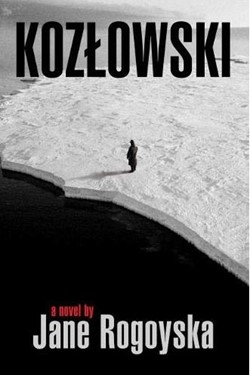Kozlowski - Jane Rogoyska
98 Books about Poland | Polish War Graves in Britain
September 1939 - Nazi Germany and the Soviet Union attack and occupy Poland. The Soviet Red Army captures thousands of Polish Army Officers and private soldiers. Amongst them is Dr Zbyszek Kozlowski a young Polish army officer and medical doctor. He and his fellow officers are loaded onto trains of cattle trucks and embark on long journeys to Soviet prisoner-of-war camps. Kozlowski's journey takes him across the Ukrainian steppe and ends at a former monastery, now being used by the Soviets as a prisoner-of-war camp, in Starobielsk, Ukraine.
Everything that was once fixed and immutable in his [Kozlowski's] life has disappeared: his country, his family, his friends, his profession...The only certainties to which he can lay claim are that he is incarcerated in a filthy monastery in the middle of the Soviet Union. (p. 153)
The camp is crowded as over four thousand Polish officers are being held there. Among them is the tall and thin Józef Czapski, an artist, who is always involved in lively discussions when visiting fellow Polish officers in the camp.
Kozlowski himself is in awe of Czapski, whose conversation, peppered as it is with allusions to poets, writers, philosophers and artists, only serves to underline his own ignorance; yet Czapski, unfailingly polite, always seems to assume that the young doctor will understand his references to Baudelaire, or Balzac, or Tolstoy. (p. 206)
Another Polish officer resident in the Starobielsk camp is Bronislaw Mlynarski, the brother-in-law of the great Polish pianist Arthur Rubinstein.
There are two dozen or so priests in the camp who conduct clandestine services in the barracks. The watchful eye of the NKVD (Soviet Secret Police) has noticed and a few days after 11th November (Polish independence day) the NKVD removes all the priests from the camp.
November 11th has provided them [NKVD] with the perfect opportunity to skim off those whose voices [patriotic and religious] have been loudest and whose actions boldest. (p. 221)
The NKVD begin interrogation of the officers. They come for an officer at night, wake them and tell them to come. NKVD specialists from Moscow conduct the interrogation. Kozlowski's turn comes and three hours later he is released back to his barracks.
Kozlowski reflects uneasily on the interview...He spoke the truth, his truth as a doctor...yet he cannot help feeling he has betrayed somebody, or something; his countrymen or his country...The officer's [NKVD] friendly demeanour...the handshake at the end...a friendly conversation with a member of the enemy's secret police. (pp. 243-244)
In the spring of 1940 rumours spread in the camp that the Soviets are intending to send the Polish officers back to their homes. On 5th April the camp authorities issue a list of the first 195 men who are asked to pack their things so that they
The train heads for Kharkov and then to a transit camp at Pavlishchev Bor. From there the officers are taken to another prisoner-of-war camp at Griazovets, near Vologda, north-east of Moscow. Hopes of a return home are dashed. Kozlowski remains in Griazovets until August 1941 when he is released under the agreement between the Polish government-in-exile in London and the Soviet government. After his release he joins the Polish Army being formed in the USSR to fight Nazi Germany under the command of General Anders.
There is concern in the Anders army when none of the other Polish officers who were at Starobelsk and other prisoner-of-war camps arrive to join the army. Where are they? Józef Czapski, also released from Griazovets is asked by General Anders to find the missing Polish officers. Despite strenuous efforts he can find no trace of them.
Czapski [says] ... "I am convinced that they were sent to a camp in the very far north or east of the Soviet Union...I remain hopeful that at least some may eventually reappear." (pp. 29-30)
The Anders army goes on to fight in Italy as Polish II Corps. Kozlowski serves in the army as a doctor with the Light Artillery. In 1945 the war is over. The Soviet Union in occupation of Poland has imposed a commmunist goverment. Kozlowski cannot go back to Poland. He decides to make a new life as a doctor in Great Britain and to leave the past behind. How though can he forget the past? His comrades in arms. Those he knew in the camp in Starobelsk, Ukraine. What happened to them? Are they still alive?
Related Material
- Jane Rogoyska website.
- Lies Matter - Jane Rogoyska on telling the story of historical events through both fiction and non-fiction (Pdf)
- Interview with Jane Rogoyska Royal Literary Fund (Audio)
- Memories of Starobielsk Essays Between Art and History - Jozef Czapski
- The Inhuman Land - Joseph Czapski
- The Officer's Wife - Katyn Massacre of Polish Army Officers
- Katyn - Death in the Forest - J K Zawodny (Polish Army Officers)
- Katyn Massacre - Louis Fitzgibbon (Polish Army Officers Murdered 1940)
- Katyn - A Crime Without Punishment (Polish Army Officers Murdered 1940)
- Children of the Katyn Massacre (1940 Soviet Murder of Polish POWs) - Teresa Kaczorowska
- Katyn (The Film) - Directed by Andrzej Wajda (Polish Army Officers Murdered)
- In The Shadow of Katyn - Stanislaw Swianiewicz (Polish Army Officers Murdered)
